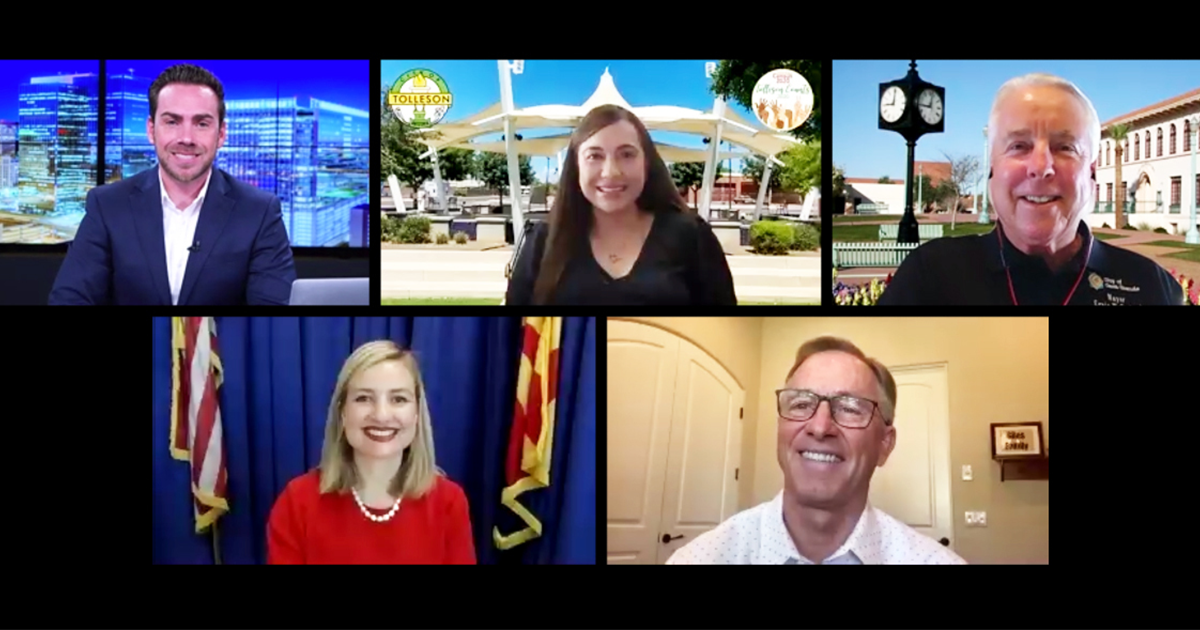

Regional Report: Mayors’ Round Table
Published: 04/30/2020
Updated: 04/22/2022
A GPEC Virtual Series
On Tuesday, the Greater Phoenix Economic Council (GPEC) hosted the latest installment in its virtual series, ‘Regional Report,’ with mayors from across Greater Phoenix discussing the impact and response to COVID-19 at the municipal level. Panelists included Mayor Kate Gallego, Phoenix; Mayor John Giles, Mesa; Mayor Craig McFarland, Case Grande; and Mayor Anna Tovar, Tolleson.
GPEC President and CEO, Chris Camacho, opened the conversation with a recap of regional efforts by GPEC and its partners to respond to the pandemic and support small businesses and continuing to keep the region top of mind with prospects in the pipeline across the world.
“[Mayors, Economic Development Directors and City leaders] have been working with our team diligently to ensure that the delivery system to help small business is very present,” he said. “We were one of the fastest growing markets in the United States entering this this downturn, and I do expect us to emerge with one of the strongest recoveries.”
Phoenix Mayor Kate Gallego hit on the fact that the Greater Phoenix’s economic viability is contingent on the health of the region’s communities. The City of Phoenix was quick to act to protect businesses and residents with Mayor Gallego issuing an executive order as they were learning about the spread of the virus at large events such as Chinese New Year.
“We’re seeing a lot of data showing that communities that take this seriously are more likely to succeed economically. If we can really do a good job of navigating this, it will position us well for a long-term.”
Gallego shared much-needed good news on the healthcare front.
“We have bent the curve; we have slowed the rate. The huge sacrifices that all of you have taken are working,” she said. “I want to start out by saying thank you to everyone for that.”
In the short-term, small businesses are relying on federal relief, which is why GPEC and its partners have worked with the City of Phoenix and others to stand up resources to help small businesses through the application process.
“I believe Arizona didn’t get our fair share in round one and so we want to do everything we can to make sure our small businesses do get our fair in round two that started yesterday,” Gallego said.
Despite the City of Mesa’s preparation for an economic downturn and increasing reserves, Mayor John Giles spoke on the precipitous impact of COVID-19.
“This certainly came a lot sooner and a lot more in a severe fashion than we were anticipating,” he said. “I am optimistic that we’ll recover quickly. The next few weeks are really going to be very telling. It will be interesting to see how we transition out of the ‘Stay-at-Home’ order.”
Case Grande Mayor Craig McFarland discussed the economic opportunities sitting at their doorstep and the differentiators between Case Grande and other municipalities as it relates to COVID-19’s impact.
“The new Lucid automotive plant that’s being built is ahead of schedule, still planned to put off its first vehicle by December of this year,” he said. “A lot of our industry is essential industry, so it continued to work. We have about 27 large manufacturing facilities here.”
While we’re still in the depths of COVID-19 and working on short-term solutions to assist small businesses, there is a long-term recovery that will take place. Taking proactive steps to implement change will be a catalyst in that process. COVID-19 has exposed vulnerabilities in supply chains and tax codes, and Tolleson Mayor Anna Tovar feels it’s important to start thinking about sales tax changes.
“I would anticipate for us to have greater flexibility when it comes to designing a different policy at the state level to allow us to see that [sales tax] income.”
In addition to helping small businesses in collaboration with other municipalities, Tovar highlighted the strain nonprofits are under and is advocating for contributions and relief to ensure communities are supported in the recovery.
“Nonprofits right now are being strained to the max capacity and funding is a big part of their survival,” she said. “Definitely an advocate to making sure that those organizations receive funding too…making sure they’re sustainable and making recovery in our communities possible.”
School life has been upended and a major issue is ensuring each student has access to connectivity and technology that will allow them to complete work online is a focus for the City of Phoenix.
“We are working with schools on increasing access to internet for children who do not have that at home right now. The business community has stepped up in a big way to try to get laptops out,” Gallego said. “All of the Mayors here today are trying to work closely with our school districts. They are our future as cities, and we have to support our students.”
Another sector of the population that is in critical need is the homeless. Case Grande, City of Phoenix and other cities have stood up programs to provide essential goods and provide short-terms housing by utilizing vacant hotels to shelter individuals.
While we wait for Governor Ducey’s decision on reopening the state, municipalities and GPEC are continuing to make small business relief a priority and financial resources are available online at gpec.org/covid-19/financial-resources/.
“Governor Doug Ducey put in an executive order and has made it clear that he is the decision maker on these issues,” Gallego said.